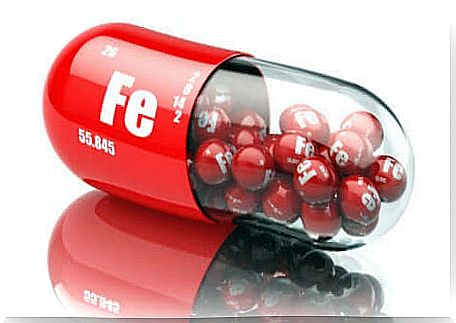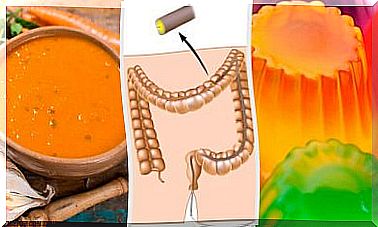Does It Make Sense To Take Iron Supplements?
Iron supplements help increase the deposition of this nutrient in the body. However, who can consume them? What should be taken into account before taking iron supplements? Find out more in this article.

Iron supplements are suitable to accompany the diet of people who cannot meet the needs of this mineral with their diet. But who are the people who can take them and those who really need them? Can they be ingested without a prescription? In what situations should you take iron supplements?
Iron is essential for the formation of hemoglobin and red blood cells. Therefore, if the right amounts are not supplied, certain complications can develop in the body. We tell you more in this article.
What are the causes of iron deficiency?
When the iron level in the blood drops, it is difficult to transport oxygen to the tissues. Therefore, symptoms such as weakness, fatigue, headaches, pallor and coldness of the hands and feet appear. More specifically, all these manifestations can indicate the presence of anemia.
As a consequence of this deficiency, one can notice that the working capacity as well as the motor activity of the body decreases. In addition, changes in the nervous system occur and increase the risk of becoming ill. In addition, iron deficiency has an impact on the lack of mobilization of vitamin A in the liver.

In what situations should you take iron supplements?
Fortunately, iron supplements are helpful in preventing these complications or treating them once they are diagnosed. They are also used to support the diet and thus obtain better results.
According to various research, there are groups of the population who have increased needs of this mineral. It can be the result of poor nutrition or stages in human development that tend to be associated with anemia. Here is more about these different situations.
Pregnant women
During pregnancy, women need more iron for themselves and their babies. If iron deficiency is marked during gestation, it increases the risk of anemia. And therefore the risk of low birth weight, premature birth or early lack of red blood cells in children.
In this regard, the World Health Organization states that more than 40% of pregnant women in the world suffer from anemia. In other words, half of this population suffers from iron deficiency.
Therefore, pregnant and breastfeeding women should consult a professional to receive the correct supplement to prevent this complication. These iron supplements come in the form of drops or tablets. In severe cases, injections may be needed. Especially if the pregnant woman experiences uncontrollable vomiting.
Babies and children up to 2 years
Lack of iron can lead to delays in psychological development, social isolation, and reduced attention span in children. Likewise, term infants can develop deficiencies if they do not receive adequate amounts of this mineral.
Adolescent girls and women of childbearing age
Some women of childbearing age are more likely to suffer from a lack of iron. Usually this is due to heavy menstrual bleeding. Iron losses are therefore greater than in other people.
In addition, adolescent girls have increased iron requirements due to their developmental stage. Metrorrhagia in young women who are experiencing their first period is a common cause of anemia.
Regular blood donors
Those who donate blood on a regular basis are more likely to suffer from iron deficiency. In this case, it is possible to counteract this lack by respecting an optimal period of time before a new donation.
Anemia due to chronic disease
According to several studies, there are chronic diseases such as rheumatoid arthritis, inflammatory bowel disease, gastrointestinal disorders, and certain types of cancer, which can interfere with the body’s ability to absorb and use iron. Therefore, people with these pathologies usually suffer from a lack.
Using iron supplements: what do you need to know?
Iron supplements can be taken in the form of capsules, tablets, chews and liquids. The most common is ferrous sulfate, but there are also other chemical forms such as gluconate and fumarate.
One key thing to know is that they absorb best on an empty stomach. However, their ingestion can cause gastric colic, nausea or diarrhea. To avoid these inconveniences, it is best to accompany them with a small amount of food.
In addition, calcium and antacids also interfere with the absorption of iron. It is therefore advisable to wait at least two hours before consuming milk, cheese, raw vegetables, caffeine or other medicines. In contrast, foods that contain vitamin C, such as citrus fruits or kiwi fruit, may be beneficial in the faster absorption of iron.
To make sure there is no deficiency, it is a good idea to have regular blood tests. This test will determine the exact values of red blood cells and hemoglobin. If necessary, it can also measure the concentrations of iron in the blood as well as the concentrations of its transporter proteins.

Does it make sense to take iron supplements?
Although these supplements are an effective strategy to increase the body’s reserves, their use is not recommended by everyone. In this regard, be aware that the ingestion of any substance not indicated by the doctor is contraindicated. Indeed, excesses also lead to complications.
In addition, remember that it is essential to follow a diet rich in foods containing iron in significant amounts. Indeed, supplements are not magic and are by no means the only strategy in the face of anemia. Finally, be aware that the drop in red blood cells is not always due to a lack of iron.









